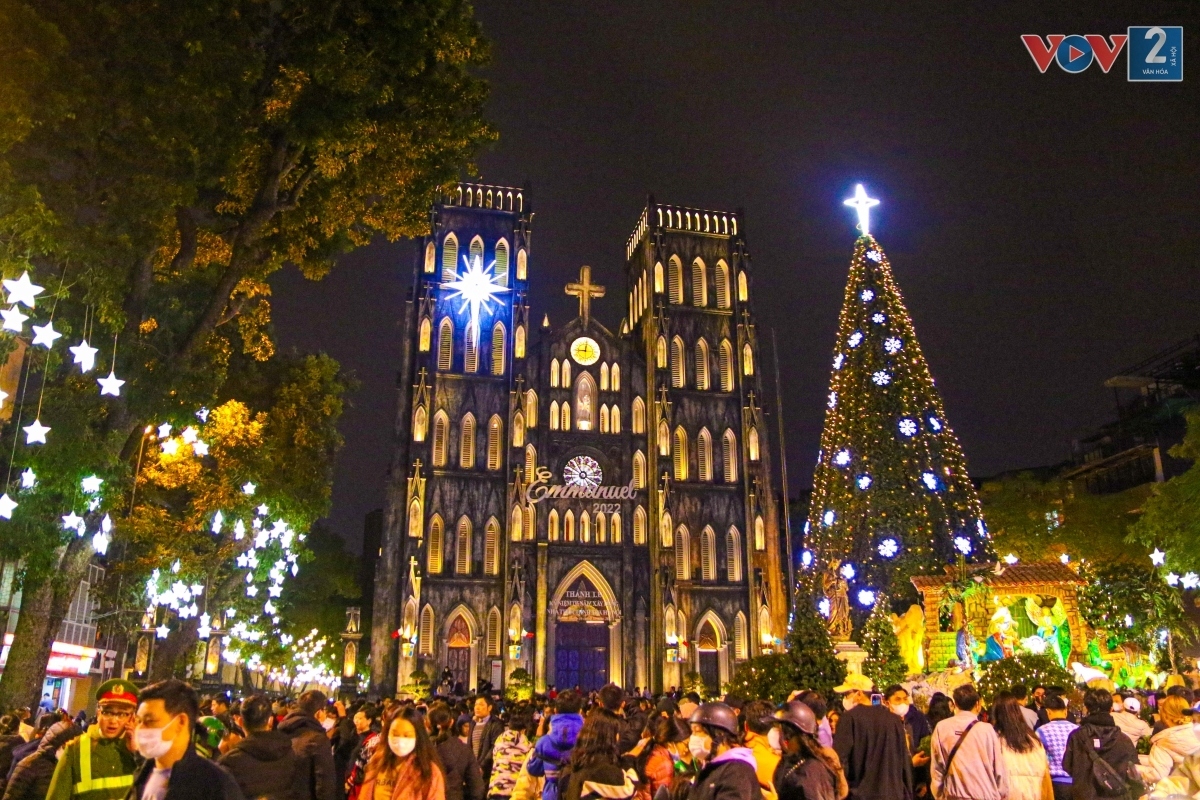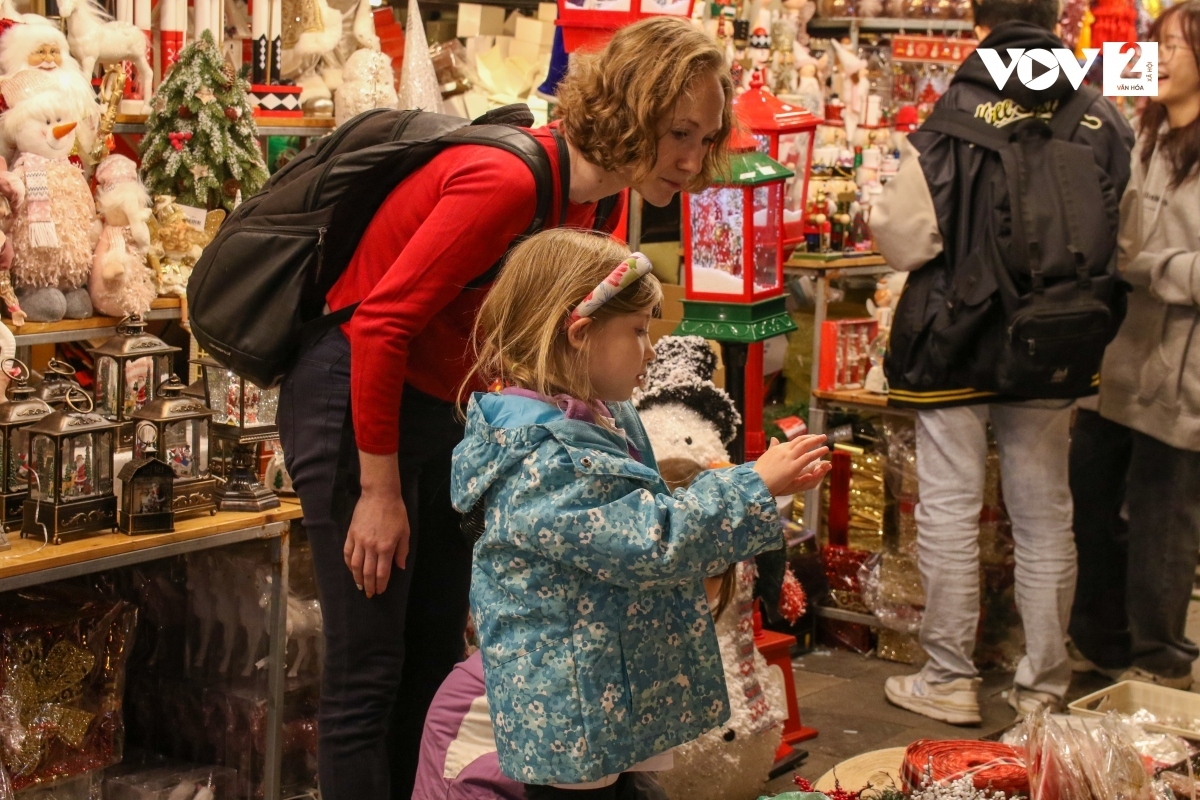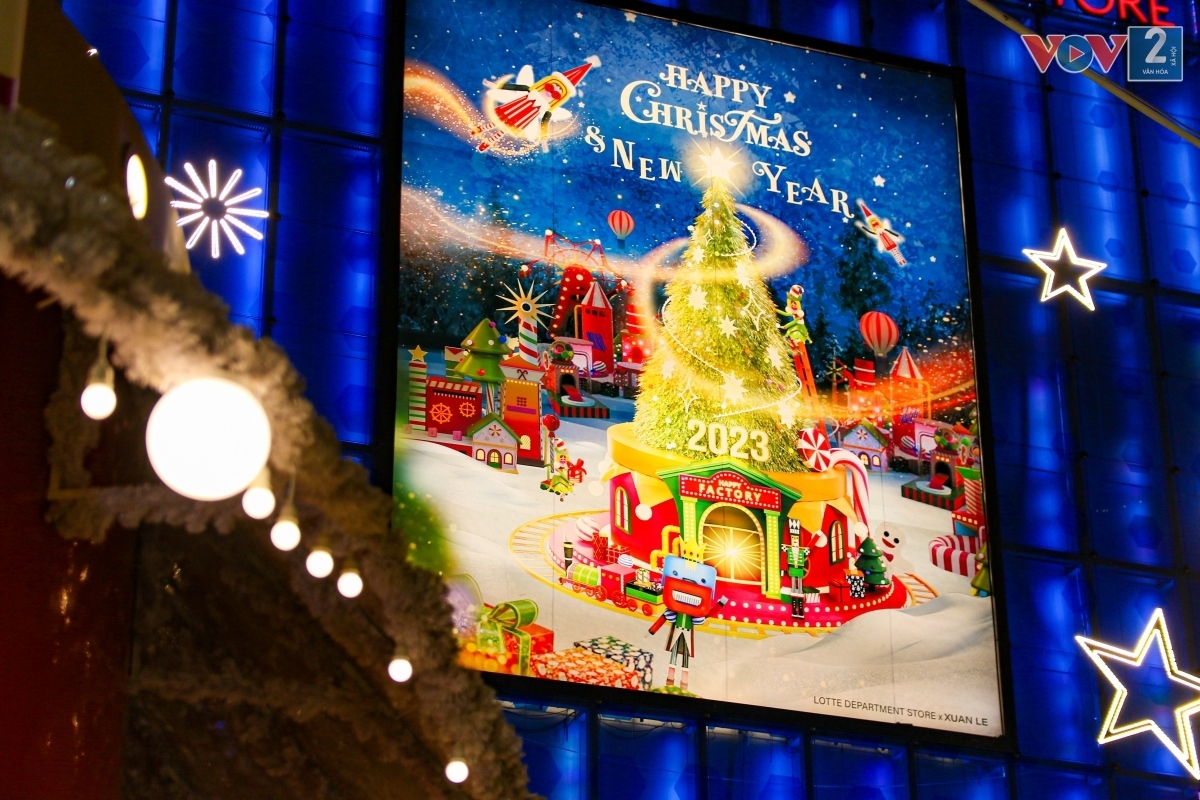The past two weeks have seen cities across the country eagerly prepare to welcome Christmas, with festive decorations adorning almost every corner. From twinkling lights to glittering decorations, the streets are abuzz with the joyous spirit of the holiday season. Residents have been reveling in the festive atmosphere, adding to the joy and excitement of the season.
Primary schools and nurseries are ringing out with the sound of traditional Christmas songs to welcome their students, shopping centres have launched a range of enticing promotions to attract shoppers looking for the perfect gifts, and businesses and residential buildings are adorned with festive decorations to celebrate the season.
Whilst these aspects of the holiday season have become more prevalent during December in Vietnam over the last few years, many traditional aspects of the festivities have so far failed to emerge in the way Vietnamese people celebrate the holiday. Indeed, it is common for many local people to think that Christmas Day is actually on December 24th as opposed to December 25th as this date coincides with the end of the Christmas sales. I recall one year seeing staff hurriedly removing festive decorations at Royal City in Hanoi on Christmas Day as the promotions had ended, with decorations for Tet being put up only a few days later.
Whilst the present-giving and commercial aspects of the holiday have become an annual occurrence throughout the world, the religious aspect of the festive period has sadly been lost in many places, including Vietnam. This is reflective of a wider trend in society, where spiritual traditions are increasingly being forgotten.
This has had an immense impact on Vietnam’s culture and economy. The country has seen an influx of investment, with foreign companies flocking to the country in search of new opportunities.
That being said, the last decade has seen an increasingly globalized world, with Vietnam’s tech-savvy younger generations able to pick up on trends emerging from London just as easily as if they were emerging from Long An. This has had an immense impact on Vietnam’s culture and economy, with the country experiencing an influx of investment from foreign companies seeking out new opportunities.

The commercialization of Christmas is not only seen in Vietnam, but is a trend that is seen throughout many societies all around the world – especially those in the West. This phenomenon can be traced back to 1931, when Coca-Cola first used Santa Claus in their advertising campaign, outfitting him in the company’s signature red and white. The images of Santa Claus in this campaign helped to spread the idea of Christmas as a commercial holiday, and has had a lasting impact on how we celebrate Christmas today.
During my lifetime, I have seen first-hand how traditional Christmas celebrations have gradually become less popular. Growing up in England, people were always aware that Christmas was a Christian festival, with many activities that had their roots in religion such as carol singing and Midnight Mass proving popular among the general population. However, in recent years, participation in these religious-based activities has declined significantly, particularly over the past decade.
Whilst I cannot speak for every Western country, the growing indifference people in England have to the religious side of Christmas can certainly be seen in tandem with the general drop in religious belief.
Statistics show that 59.3% of the population of England and Wales in 2011 were Christian, with this falling to 46.2% in 2021. The decline of religious traditions at Christmas can therefore be seen in correlation with the growing religious apathy in Western countries such as the UK.
Whilst I’m sure these elements will not completely vanish from Christmas festivities altogether, it is not unexpected that they have not become a mainstream component of Christmas activities in Vietnam.
At this joyous time of year, many Western countries choose to fill the airwaves with festive Christmas songs and broadcast classic holiday shows and movies. Through these films, viewers are invited to explore the true meaning of Christmas in a meaningful and memorable way. Along the journey, characters discover that Christmas isn’t just about presents and decorations, but a time to be celebrated with loved ones and to spread cheer and goodwill throughout the world.
Now, Christmas is all about having fun, expressing love and affection, and exchanging gifts with family and friends. With the prevalence of technology and the need for convenience, online shopping has become a popular way for people to purchase gifts and other items during the Christmas season. This has allowed for more people to get access to a wide variety of products, from home decor to clothing to electronics, at competitive prices. Additionally, this has made it easier for people to access unique and special gifts that may not be available in local stores. Despite the convenience of online shopping, it is still important to exercise caution when making purchases over the internet. It is important to ensure that the website is secure, that the payment system is reliable, and that the product itself is legitimate and high-quality. Although Christmas is a time for joy and celebration, it is also a time for being mindful of security and safety.
Although officially meant to celebrate the birth of Jesus, Christmas has taken on an entirely different meaning over the past few decades due to the decline in terms of the number of Christian believers coupled with the increase in consumerism during the holidays. Now, Christmas is all about having fun, expressing love and affection, and exchanging gifts with family and friends. With the prevalence of technology and the need for convenience, online shopping has become a popular way for people to purchase gifts and other items during the Christmas season. This has allowed for more people to get access to a wide variety of products, from home décor to clothing to electronics, at competitive prices. Additionally, this has made it easier for people to access unique and special gifts that may not be available in local stores.
Despite the convenience of online shopping, it is still important to exercise caution when making purchases over the internet. It is essential to ensure that the website is secure, that the payment system is reliable, and that the product itself is legitimate and of high-quality. Although Christmas is a time for joy and celebration, it is also a time for being mindful of security and safety.
Although officially meant to celebrate the birth of Jesus, Christmas has taken on an entirely different meaning over the past few decades due to the decline in terms of the number of Christian believers coupled with the increase in consumerism during the holidays. Now, Christmas is all about having fun, expressing love and affection, and exchanging gifts with family and friends.
With the prevalence of technology and the need for convenience, online shopping has become a popular way for people to purchase gifts and other items during the Christmas season. This has allowed for more people to get access to a wide variety of products, from home décor to clothing to electronics, at competitive prices. Additionally, this has made it easier for people to access unique and special gifts that may not be available in local stores.
Despite the convenience of online shopping, it is still important to exercise caution when making purchases over the internet. It is essential to ensure that the website is secure, that the payment system is reliable, and that the product itself is legitimate and of high-quality. Although Christmas is a time for joy and celebration, it is also a time for being mindful of security and safety.
Christmas is a time for families to come together, to celebrate the birth of Jesus Christ and to cherish the memories of the year that has passed. It is a time for joy, for giving and for sharing. During this time, we remember the true meaning of Christmas: love and kindness. We remember that it is not about the presents, but about the time spent with family and friends.
Most people typically associate Christmas with gift giving, but the deeper meaning behind this is one that has not been lost. Christmas is a time for families to come together, to rejoice in the birth of Jesus Christ and to cherish the memories of the year gone by. It is a time for happiness, for giving, and for sharing. During this time, we remember the true meaning of Christmas: love and kindness. We remember that it is not about the presents, but about the time spent with family and friends, and the joy of giving to those we love.

Family gatherings, sharing, and spending time with loved ones are activities that transcend cultures and borders. In fact, these themes have been widely embraced and celebrated by people of all faiths and backgrounds, thanks to the increasing popularity of the festival among non-Christians around the world.
These values are the positive aspects of Christmas that have been exported from Western countries and embraced with enthusiasm in places like Vietnam. Such a widespread adoption of this holiday is a testament to its universal appeal and the diverse beauty of global cultures.
While Vietnam is predominantly Buddhist or local people follow folk traditions such as ancestor worship, celebrations for Christmas typically involve family gatherings, special meals, and present giving. Giving and sharing are now the primary themes of Christmas, not just in Vietnam, but in many countries throughout the world, including those which can trace celebrations back nearly 1,000 years.

Whilst the world has become smaller due to the increased connectivity brought about by the Internet, our traditions can still teach us something about different cultures and serve to bring us closer together. By exploring and understanding different customs, we can foster a more tolerant and unified global community. Such an understanding can be a powerful tool in creating a more harmonious world.
With major cities nationwide now ready for Christmas, both local people and tourists to Vietnam can sample the festive atmosphere by heading to spots such as St Joseph Cathedral in Hanoi to enjoy the holiday period or alternatively attend a Christmas concert held at the Opera House in Ho Chi Minh City.
In addition, plenty of fun and festive Christmas events are being held specifically for children across the country to ensure that people throughout the nation enjoy a joyous holiday season.
Although Christmas traditions passed down through generations in Western countries have yet to gain widespread popularity among the Vietnamese population, there are still plenty of positive aspects of the festivities that can be found in the way local people celebrate. From traditional decorations to festive meals, Vietnamese people have adopted numerous Christmas customs and incorporated them into their own unique celebrations. Additionally, the season is marked by joyful gatherings of family and friends, making it a time of togetherness and merriment. By embracing the positive aspects of Christmas, the Vietnamese people have created a unique and vibrant festive atmosphere.
It is my hope that these themes will be a legacy of the global spread of Christmas and that local people can enjoy spending time with their loved ones after enduring a turbulent few years.









